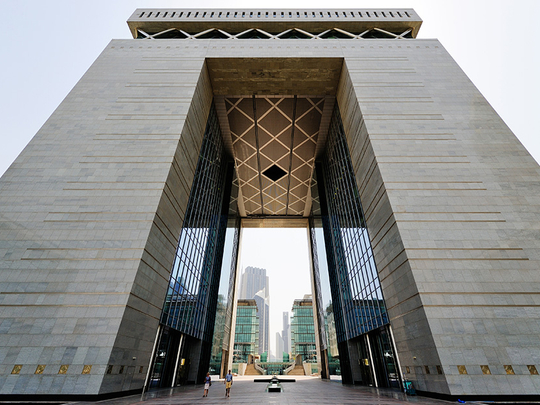
While the continued decline in oil prices has put the brakes on economic growth in the UAE and may cause banks to become more prudent in their lending in 2016, the country is expected to remain resilient next year, bankers and analysts say.
Most businesses are also in good enough shape to weather tougher borrowing conditions. The price of oil slipped to a six-and-a-half-year low on December 7, trading at below $42 (Dh154) a barrel. As a result of lower oil prices the UAE economy is expected to run its first fiscal deficit in five years, the IMF predicts. Growth is estimated at 3.2 per cent, down from 4.6 per cent in 2014, according to the Washington-based firm.
Lower oil prices have had a knock-on effect on the banking system, shrinking deposits for two consecutive quarters. Central Bank data showed deposits shrivelled 0.45 per cent to Dh1.43 billion in the three months to September, down from Dh1.44 billion in June. Deposits grew just 1.6 per cent in the year to September, a substantial drop from just nine months ago, when banks in the UAE had deposits expanding at an annualised rate of 11.1 per cent.
“The revenue available to governments and related entities has declined and their deposits have also shrunk quite a bit over the past 12 months,” says Timucin Engin, Director of Financial Services at Standard & Poor’s Ratings Services in Dubai. “Government deposits are important to support the funding profile of [oil-producing nations] and the UAE is not different.”
Businesses are likely to come under pressure in two ways. First, subdued economic growth is likely to make it harder for them to grow profits; some may even struggle to pay back existing loans. Second, tightening liquidity is likely to increase the cost of borrowing. “Overall I think corporate conditions are more challenging,” says Engin.
Nevertheless, there are numerous reasons for optimism. First, banks put more stringent controls in place following the 2008 global financial meltdown.
“While the formation of new non-performing loans is inevitable with the economic slowdown, the development should be contained because the UAE banks had already introduced tighter credit standards following the 2008-9 credit crisis,” says Luciano Jannelli, Head of Investment Strategy at Abu Dhabi Commercial Bank. “Thus, while credit costs will go up for UAE banks, this should be manageable.”
Second, while liquidity is tightening, an all-out credit crunch is unlikely. “There was [previously] a lot of liquidity in the system,” says Engin. “So while the excess available to banks is [drying up], we believe the banks are still OK overall; they will just have to be more careful because they don’t have that ample liquidity any more.”
The changes in liquidity are reflected in the three-month Emirates Inter Bank Offer Rate (Eibor), which increased to 0.96 per cent in November up from 0.68 per cent in January 2015.
Garbis Iradian, Chief Economist for the Middle East and North Africa at the Institute of International Finance, agrees. “Despite low oil prices, UAE banks should remain sound in the short term because of their strong initial balance sheets and the expected resilience of the UAE economy,” he says.
Likewise, most UAE businesses are also in solid health. “Most corporate balance sheets of the non-financial sector in the UAE are in good shape,” says Jannelli. “There might be some difficulties, but overall the UAE corporate sector is financially very healthy and resilient to some reduction in credit extension.”
Third, the UAE has developed one of the most diversified economies in the region. The non-oil sector accounts for about 50 per cent of Abu Dhabi’s economy and more than 80 per cent of Dubai’s. The UAE government plans to reduce reliance on oil by up to 10 per cent in the next 15-20 years.
Last month, the government unveiled a plan to invest Dh300 billion in science and advanced technologies, with more than 100 projects spanning stem cell research and bio-technology, robotics and solar power. “Looking beyond the short- to medium-term scenario, it also makes sense to point out that the current difficulties are likely to trigger reform processes that are actually healthy for the country,” says Jannelli.
“While the current fiscal consolidation measures will dampen growth in the coming years, over a longer horizon, continuing progress in economic diversification and prudent fiscal policies will promote growth, gradually limiting the negative impact of lower oil prices.”
Also providing optimism is expectations that a Iran nuclear deal will catalyse trade and investment opportunities. Moreover, Expo 2020 in Dubai is expected to offer fresh lending opportunity for banks. “Expo 2020 is a multi-billion project and with a view of kick-starting the projects on time, financing will start in 2016,” says Jannelli. “So, yes, it should be a major contributor to loan growth next year and should, —at least partly, —compensate for less loan growth on other fronts.”








